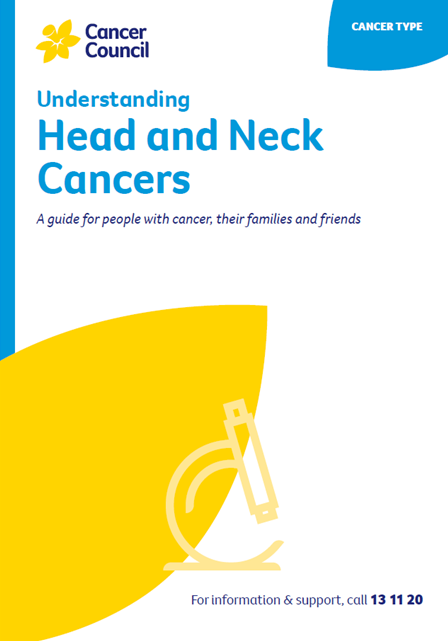- Home
- Head and neck cancers
- Managing side effects
- Changes to appearance
Changes to appearance
Many types of surgery for head and neck cancer will cause temporary or permanent changes to the way you look.
Learn more about:
Common physical changes
| Weight loss | It is common to lose weight during treatment and many people find it hard to put the weight back on. |
| Feeding tubes and stomas | People who need a feeding tube or tracheostomy tube or who have a stoma following a laryngectomy may feel self-conscious about it. |
| Scars | Improved surgical methods mean that most people won’t have major scarring. Surgeons will try to hide scars in skin creases in the neck or on the face, and the scars usually fade over time. Scars from radiation therapy may change the colour or texture of the skin. |
| Face | In some cases, removing the cancer means removing an eye or part of the jaw, nose, ear or skin. Some people have reconstructive surgery using tissue from another part of the body. Other people may have a prosthesis (e.g. a nose prosthesis), a soft plastic replacement for the tissue that has been removed. A prosthesis will be specially fitted to blend in well with your own features. If you are likely to need a prosthesis, the surgeon will discuss it with you before the operation. |
| Jaw and teeth | For certain cancers, your surgeon will need to cut through your jaw (mandibulotomy) and reconstruct it with a plate. This involves a cut through your chin and lip, and the scars will be noticeable for some time. If you have lost teeth due to cancer treatment, you may be able to have further surgery to replace or reconstruct them. |
| Swelling | Surgery or radiation therapy can damage lymph nodes, and cause swelling called lymphoedema. |
Tips for adjusting to appearance changes
- Try to see yourself as a whole person (body, mind and personality) rather than focusing only on the part of you that has changed.
- Talk about how you are feeling with a family member, friend, social worker, occupational therapist or psychologist.
- Look Good Feel Better workshops can be booked at lgfb.org.au. They show you how to use hats, wigs and skin care to boost self-esteem, and are for all genders.
- Ask your treatment team how surgery will affect your appearance and if you will be offered reconstructive surgery or a prosthesis to rebuild parts of your face and neck. Your team can suggest ways to cope and refer you to support services.
- Give yourself time to get used to any changes. Some may be temporary or prove with time.
Podcast: Coping with a Cancer Diagnosis
Listen to more of our podcast for people affected by cancer
More resources
A/Prof Martin Batstone, Oral and Maxillofacial Surgeon and Director of the Maxillofacial Unit, Royal Brisbane and Women’s Hospital, QLD; Polly Baldwin, 13 11 20 Consultant, Cancer Council SA; Martin Boyle, Consumer; Dr Teresa Brown, Assistant Director Dietetics, Royal Brisbane and Women’s Hospital, Honorary Associate Professor, University of Queensland, QLD; Dr Hayley Dixon, Head, Clinical Support Dentistry Department, WSLHD Oral Health Services, Public Health Dentistry Specialist, NSW; Head and Neck Cancer Care Nursing Team, Royal Melbourne Hospital, VIC; Rhys Hughes, Senior Speech Pathologist, Peter MacCallum Cancer Centre, VIC; Dr Annette Lim, Medical Oncologist and Clinician Researcher – Head and Neck and Non-melanoma Skin Cancer, Peter MacCallum Cancer Centre, VIC; Dr Sweet Ping Ng, Radiation Oncologist, Austin Health, VIC; Deb Pickersgill, Senior Clinical Exercise Physiologist, Queensland Sports Medicine Centre, QLD; John Spurr, Consumer; Kate Woodhead, Physiotherapist, St Vincent’s Health, Melbourne, VIC; A/Prof Sue-Ching Yeoh, Oral Medicine Specialist, University of Sydney, Sydney Oral Medicine, Royal Prince Alfred Hospital, Chris O’Brien Lifehouse, NSW.
View the Cancer Council NSW editorial policy.
View all publications or call 13 11 20 for free printed copies.



